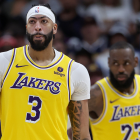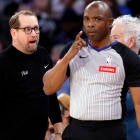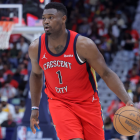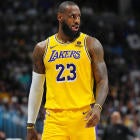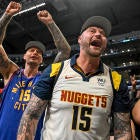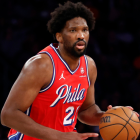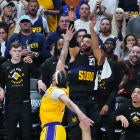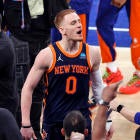Steve Nash didn't mince words in discussing his experience playing for Team Canada during a recent appearance on The Bill Simmons podcast. "I went to the Olympics in 2000 and it springboarded my career," Nash explained. "It was the best experience of my career, and I think that next year I was a borderline All-Star."
He wasn't lying. Nash, a bench player for most of his career to that point, was the breakout star on a Dallas Mavericks team that won 53 games. His scoring jumped by seven points per game, and only a year later, he made the first of his eight All-Star appearances. That summer alongside Pete Guarasci and Michael Meeks laid the groundwork for Nash to lead the NBA's No. 1 ranked offense in three of the next four seasons alongside Dirk Nowitzki and Michael Finley.
International accolades are largely footnotes for American players. It's hard to glean much about a player when he's surrounded by four other All-Stars. But for foreign players, major international competition is typically the first harbinger of what is to come.
In 1999, a 21-year-old Dirk Nowitzki was the fifth-leading scorer at Eurobasket after a rookie year in which he scored only 8.2 points per game. His scoring more than doubled upon his return. Marc Gasol came to the 2008 Olympics as nothing more than Pau's little brother. He left as the starting center for the Memphis Grizzlies. In 2016, a little-known rookie named Nikola Jokic led Serbia to a surprise silver medal. He just finished fourth in MVP voting.
Look back at just about any significant international tournament and you'll find a player who used it as a launching pad into NBA success, and this year's World Cup shouldn't be an exception. After all, in a tournament with the NBA MVP and an American roster with multiple All-Stars, the best player was a 27-year-old bench scorer from a lottery team just begging for more opportunity.
The numbers Bogdan Bogdanovic posted in the World Cup were absolutely breathtaking. He had a higher field goal percentage at 55.6 percent than Giannis Antetokounmpo. He made 35 3-pointers in eight games, more than seven countries did in the entire tournament. He shot 53 percent from behind the arc in the tournament. Argentina, the silver medalist, made 50.8 percent ... of its 2-pointers. If someone put up those numbers against you in a video game, you'd assume they were cheating.
Bogdanovic isn't. He, like many foreign stars before him, is merely taking advantage of a system that is far more conducive to his success than the NBA. The Sacramento Kings have spent two years squeezing him into a backcourt with De'Aaron Fox and Buddy Hield. As former high lottery picks, they have received more organizational investment.
Whereas Sacramento's offense is designed to accentuate their strengths, Bogdanovic has been forced into an awkward role as a backup point guard. He is a tremendous passer for a wing, but he isn't exactly Nash. If the World Cup has proven anything, it is how lethal Bogdanovic can be when properly utilized as an off-ball weapon.
Serbia has no such predilections. Jokic is the team's biggest star, but its offense is built around Bogdanovic because he has been its most effective scorer. Plays are drawn up specifically for him, and one of their most common is a basic dribble-handoff.
This is a simple play, but Serbia runs it and its variants quite often. The Kings, on the other hand, ran the eighth-fewest handoff plays in basketball last season, per NBA.com. Bogdanovic attempted only one shot off of handoffs per game last season. That is at least partially due to the presence of Hield, who also thrives off of such shots and takes 1.5 of them per game. It is easier for him to do so, as he didn't need to handle the ball as much as Bogdanovic.
Bogdanovic doesn't need to share with Serbia, and that is meaningful. One of the advantages of a handoff is that the screen buys the shooter a moment to square up and set his feet if he doesn't choose to use his momentum to attack the basket. Though the biggest shot of his NBA career was an off-balance buzzer-beater against the Los Angeles Lakers, Bogdanovic is a much more comfortable shooter with time to gather.
An ideal model would be something similar to Philadephia's recent usage of JJ Redick, the NBA's leader last season with 4.5 shots per game off of hand-offs. Not only would such a setting create better looks from behind the arc, but it would allow Bogdanovic more space to act creatively as a ball-handler. The Kings scored only 0.83 points per possession with him as the ball-handler in the pick-and-roll last season, an utterly pedestrian number on the NBA's bread-and-butter play. His World Cup play demonstrated how much more dangerous he is when he can take advantage of the chaos excessive screening causes to over-leverage a defense.
Another underutilized skill of Bogdanovic's is his cutting. Serbia's passing, particularly from its big men, makes plays like this rather common.
It's another simple play, but a thoughtful one. Bogdanovic times his acceleration around the second big man jumping out onto the perimeter, giving him a clear path to the hoop. That is a valuable instinct, but one that he hasn't been able to exercise enough in the NBA. Only two Kings teammates used a smaller percentage of their possessions on cuts last year than Bogdanovic: Fox and Yogi Ferrell, Sacramento's two other point guards.
Playing Bogdanovic with point guards more often would seemingly create more cutting opportunities for him. But Bogdanovic spent only half of his 1,947 minutes on the floor last season with Fox. Ferrell, a point guard in name, was a sub-replacement level player who was typically little more than a bystander to Bogdanovic's creation last season.
It is a misuse of his talents, but a justifiable one. The Kings have priorities. Fox is the face of the franchise. Their own owner reportedly believes Hield can be the next Stephen Curry. The Kings have cast their lot with them. Possessions and play calls are finite in the NBA.
Other teams could be more accommodating. Bogdanovic will be a free agent next summer. He is eligible for a contract extension starting at 120 percent of his current salary, which comes out to around $51.4 million over four years. Not bad money for a conventional backup, but given his play in the World Cup, Bogdanovic likely won't take such a deal.
But Hield, who is eligible for a max contract worth up to $170 million over five years, very well could re-sign before the season. Harrison Barnes already did on a four-year deal worth nearly $90 million. DeWayne Dedmon, Trevor Ariza and Cory Joseph could cost over $100 million over the next three seasons, and Fox will almost certainly get the max next summer. Sacramento is going to draw the line somewhere.
The Kings' loss is going to be someone else's gain, even if it is a pricey one. The weakness of the 2020 free-agent class is well known, but there are advantages to such a dearth of talent. The focus will be on finding the right players, not necessarily the best ones, and the sort of teams in position to do so are better equipped to maximize his talents.
Say, for instance, he landed neatly within Toronto's nearly limitless pile of cap space. The Raptors don't currently have a shooting guard of note on their roster. Between Fred VanVleet and Pascal Siakam there is enough ball-handling to keep him sated off of the ball, but not so much as to prevent him from making plays on it. The Raptors have placed a premium on passing big men under Masai Ujiri, and whether Marc Gasol is back or they sign a replacement like Domantas Sabonis, the Raptors would likely furnish him with a center stylistically similar to what he was used to with Serbia. Nick Nurse coached in the World Cup and is more than creative enough to maximize his skill set.
As idyllic as such a scenario might seem, there are plenty of others in the same vein. Dallas can create the cap space to pair him with Luka Doncic and Kristaps Porzingis. New Orleans could sign him as a long-term Redick replacement. Forward-thinking teams are going to notice his World Cup performance, and in a summer with very few available difference-makers, Bogdanovic presents a tantalizing alternative to traditional star-chasing. History suggests that he is ready for a leap, even if the Kings are unable to serve as his trampoline.














